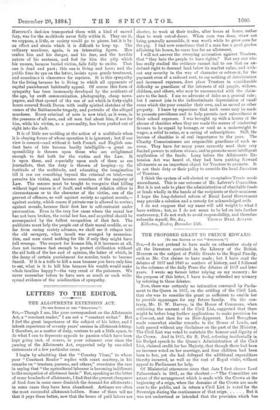LETTERS TO THE EDITOR.
THE ALLOTMENTS EXTENSION ACT.
[To THE EDITOR OF THE " SPF.CTATOR."I SIR,—Though I am, like your correspondent on the Allotments Act, a "constant reader," I am not a "constant writer." But I feel the great importance of the subject of his letter, and I inherit experience of seventy years' success in allotment-letting. I therefore, as a matter of duty, venture to ask a little space, to do what I can to deprecate appeals to passion which have been kept going (not, of course, in your columns) ever since the passing of the Allotments Act, supported only by one-sided statements of a few particular cases.
I begin by admitting that the "Country Vicar," to whom your "Constant Reader" replies with scant courtesy, in his remarks on "trustees, parsons, and others," overstates the case in saying that "the agricultural labourer is becoming indifferent to the occupation of allotment lands." But, speaking as the letter of some hundreds of allotments, I find that the present cheapness of food does in some cases diminish the demand for allotments ; in some cases they have been abandoned. Artisans are often the most successful allotment-holders. Some of them tell me that it pays them better, now that the hours of paid labour are
shorter, to work at their trades, after hours at home, rather than to work out-of-doors. When corn was dear, straw not
being generally accessible, it was worth while to grow corn for the pig. I find now sometimes that if a man has a good garden adjoining his house, he cares less for an allotment.
I will not answer the sweeping accusation against Trustees, that "they hate the people to have rights." But any one who has really studied the evidence cannot fail to see that an un- defined right to demand land below its market value, and with- out any security in the way of character or solvency, for the payment even of a reduced rent, to say nothing of deterioration and increased expenses, does place Trustees in considerable difficulty as guardians of the interests of old people, widows, children, and others, who may be unconnected with the claim- ants to the land. I am no advocate of doles as a general rule ; but I cannot join in the indiscriminate depreciation of small sums which the poor consider their own, and as sacred as other
property. I know by experience that such sums may be made
to promote providence and to help parents (not subscribers) in their school expenses. I was brought up with a horror of the abuses of charities when they are made the means of conferring favours to be repaid by homage, or used as a makeweight to wages, a relief to rates, or a saving of subscriptions. Still, the income of charities is of real importance to the poor. The Charity Commissioners are responsible guardians of such in- come. They have for many years earnestly used their very limited powers to reform abuses, and to promote more intelligent application of the funds. Long before the Allotments Ex- tension Act was heard of, they had been putting forward allotments as an important object for Trustees to promote. It is not their duty or their policy to override the local discretion of Trustees.
I think the system of sell-elected or co-optative Trusts needs amendment. This is one outcome of Mr. Lefevre's Committee.
But it is not safe to place the administration of charitable funds or lands wholly in the hands of the recipients or their nominees. I hope the long-deferred reform of Rural Local Government may provide a solution and a remedy for acknowledged evils.
I do not suppose that my name will add weight to what I have written ; but, as I do not mean to be led on into further controversy, I do not wish to avoid responsibility, and therefore subscribe myself, Sir, &c., THOMAS DYKE ACLAND. Killerton, Exeter, December 15th.






































 Previous page
Previous page